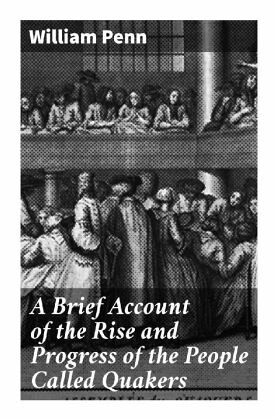
A Brief Account of the Rise and Progress of the People Called Quakers
Versandkostenfrei!
Versandfertig in 6-10 Tagen
6,99 €
inkl. MwSt.

PAYBACK Punkte
3 °P sammeln!
In "A Brief Account of the Rise and Progress of the People Called Quakers," William Penn articulates the historical trajectory and spiritual underpinnings of the Quaker movement. Through a lucid narrative interspersed with personal anecdotes, Penn employs a reflective and fervent literary style that resonates with the ethos of 17th-century religious dissenters. His work is situated within the broader context of the English Civil War and the quest for religious freedom, providing both a historical account and a theological exposition that highlights the principles of peace, equality, and inner ...
In "A Brief Account of the Rise and Progress of the People Called Quakers," William Penn articulates the historical trajectory and spiritual underpinnings of the Quaker movement. Through a lucid narrative interspersed with personal anecdotes, Penn employs a reflective and fervent literary style that resonates with the ethos of 17th-century religious dissenters. His work is situated within the broader context of the English Civil War and the quest for religious freedom, providing both a historical account and a theological exposition that highlights the principles of peace, equality, and inner light central to Quaker belief. William Penn, a prominent Quaker leader and founder of Pennsylvania, wrote this text as both an apology for and a celebration of his faith. His own experiences of persecution and his commitment to religious tolerance informed his views, making the book not merely a historical account but a passionate plea for understanding and acceptance. Penn's connection to influential Quaker figures and his own leadership role lent authority to his narrative, allowing him to explore the renowned Quaker testimonies of simplicity, integrity, and community. This essential text is highly recommended for anyone interested in the intersection of faith and social justice, as it provides a profound insight into the origins of Quakerism while echoing contemporary discussions on tolerance and human rights. Readers will gain not only historical knowledge but also a deeper appreciation for the enduring legacy and moral framework of the Quaker tradition.












